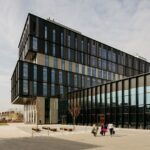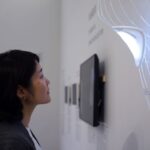1. Please provide a brief description of the KE project/ case study and why you believe it is considered good practice or innovative (and for whom).
The University of Roehampton established an institutional Civic and Corporate Partnerships Board, and new Advisory Boards of major employers and stakeholders in each academic school or faculty. The objective is to facilitate exchange, identify opportunities and areas for collaboration, and to develop improved mechanisms for employers to shape our curricula, engage staff, and develop graduate talent. These advisory boards operate at a faculty/school level and are aligned to specific needs. The institutional Civic and Corporate Partnerships Board oversees this and ensures the infrastructures are in place to support these exchanges, and to set strategic priorities across the institution. The Chairs of each advisory board sit on the Civic and Corporate board to ensure alignment in our mission and goals.
At the school level, we’ve engaged the broadest range of employers appropriate to the subject clusters. To secure membership, we took a three-pronged approach. We identified existing employer partners who we asked to join the boards; we developed other employers that broadly align to the school’s work and reached out to build new relationships; and finally, through alumni engagement including recent and more well-established alumni. This has given recent alumni the opportunity to hone their own skills and expand their professional networks.
2. Where did the idea for the project/programme come from? Was this related to a strategic objective? How did you secure senior buy in?
Our 2020-2025 Research and Knowledge Exchange Strategy set our our ambition to ensure our research supported our local community and sub-region, and to expand our applied and engaged research and teaching. Within that broader strategic framework, we have looked for ways to facilitate two-way engagement with major sub-regional stakeholders, in order to better understand how we our research can be useful for potential users and stakeholders. The senior executive have played a fundamental role in setting and supporting the delivery of these strategic objectives.
3. What impact/ outcome has this project/ activity had on your university? Students? Local economy? Staff? Other external parties, e.g. businesses.
We are at the early stages of embedding this work in our education and research and knowledge exchange, but it is already benefitting our institution in terms of our approach to external engagement. The external engagement supported through these boards is developing the university’s capacity to broker relationships with employers, stakeholders, and collaborators.
The boards are delivering tangible benefits for the institution. They have opened up opportunities for placements and apprenticeships for students to gain work experience and direct routes to employment. We had our first KTP awarded from Innovate UK and we have been part of the Shared Prosperity Fund bidding process. Our grant capture and business investment into the university are both increasing significantly. Our colleagues are demonstrating a greater strategic awareness of the benefits of generating KE income and facilitating these opportunities, and the advisory board contacts have helped individual academics to build their own networks, and thinking about their research and teaching in different ways.
4. How did you measure impact?
We update the University Council and Senate about the implementation of our RKE strategy, and the Advisory Boards are a key element of this reporting.
5. What types of resources were required to implement this project?
The Advisory Boards include a combination of time investment from key academic staff and leaders at executive level. We have been very generously supported by external representatives on these boards, who have committed a significant amount of their valuable time. All Boards meet between 1-2 times per term. The Corporate and Civic engagement Board meets twice a term.
There is a real challenge in terms of what we’re asking of our external members, and our ability to compensate them. This also has an impact on who can commit their time to the board. We are actively exploring ways of ensuring we are as inclusive as possible in engaging external advisory board members.
6. Describe any challenges that you have had to overcome either before, during or after implementing this project?
We have worked hard to ensure that the advisory boards are really focused on graduate employability and knowledge design, and that there are a clear set of objectives. It is important that everyone can see the value of their contributions.
We have also had to be flexible to recognise the competing priorities on people’s time. We have maintained as much flexibility as possible for these advisory boards as a result. For example, they don’t have to have a certain level of attendance to be quorate. We have made sure that meetings have remained hybrid so that has opened up a wider talent pool and made participation easier. We’ve also tried to maintain that committee work in between meetings is light. The University draws on the advice of members, but is also responsible for delivering on the actions.
7. How have you ensured there is a process for ownership and review into this activity? Noting this is leading to sharing good practice, how have you ensured there is a process for review and continued ownership into this activity?
The process of setting up and maintaining these Boards is now embedded as part of business as usual for our academic units. The advisory boards are all, however, at different stages of maturity. As such, the Civic and Corporate Partnerships Board is an effective means of sharing good practice and for reviewing the effectiveness of the advisory boards across the University.
8. What advice would you give others in trying to engage with hard-to-reach groups?
As a widening participation institution, approximately 60% of our students are from minority backgrounds, 60% are first in family to attend university, and a large number of our student come from other underrepresented groups in higher education.
Our commitment to widening participation and social justice is central to all of our work, and this is true of our advisory boards, too. We have sought members who act as role models for our students, and who align with our values. We have also sought out alumni who understand the experience of our students, and represent their interests and ambitions.
9. Next steps?
The Advisory Boards have a key role to play to ensure to make sure we’re in tune to the future needs of employers, partners and collaborators at the outset. We want to build more direct links with employers to inform our curriculum. This will be a stronger focus of our advisory boards in the future. As we move into new portfolio areas we will also consider ways of expanding this model, to ensure that our academic priorities are developed in collaboration with our key stakeholders.










